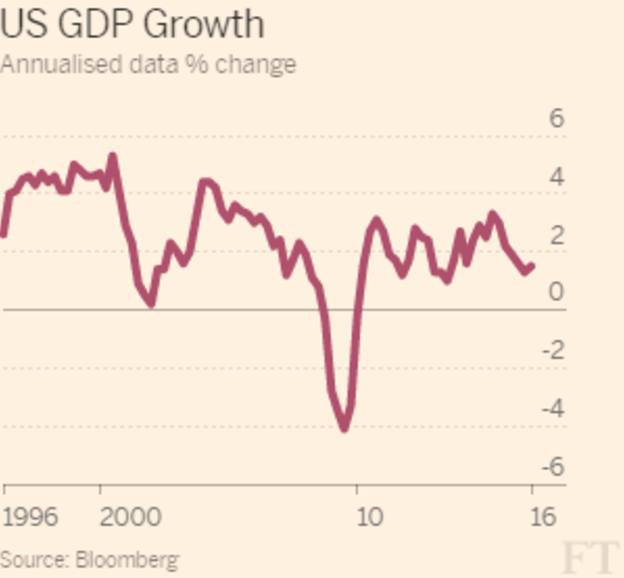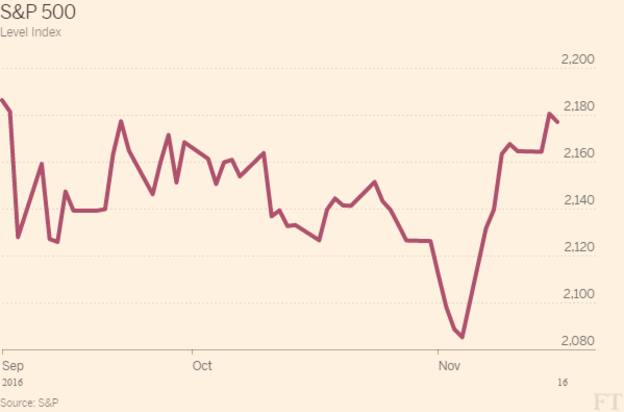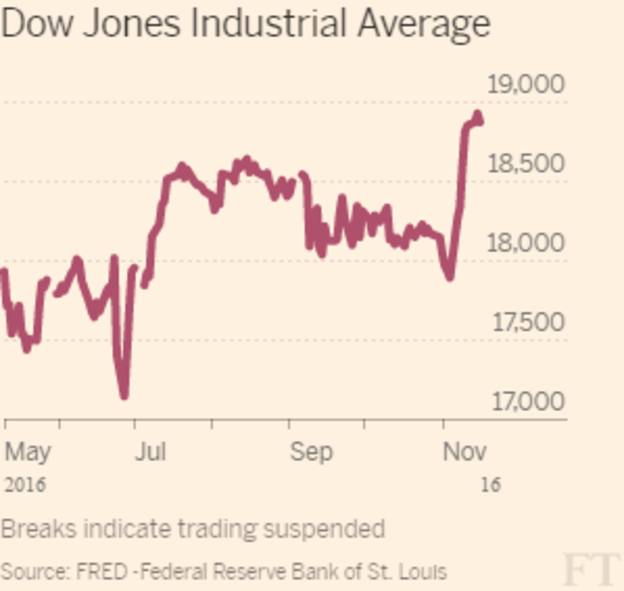
Article 1 / 3
Guide to President Trump's impact on investmentsUS winners and losers under Trump

Mr Trump's policies, which he laid out to the markets after the election result in a speech designed to mollify and calm, are definitively pro-growth.
According to Nancy Curtin, chief investment officer at Close Brothers Asset Management, while his win came as a "surprise" to investors, and is likely to bring higher volatility, "we think there are some positives to this outcome as well as some risks".
The President-Elect's proposed economic policies have been designed to bolster the US economy, driving its GDP up to reach heights not seen since the early 2000s.

In a nutshell, his policies are:
- Reduce corporate tax rates from 35 per cent to 15 per cent and simplify the tax code.
- Allow repatriation of offshore cash (estimated at US$2.6trn) through a one-off tax amnesty of 10 per cent. This could bring more than US$150bn into the US Treasury.
- Spend US$1trn over five to 10 years on infrastructure projects.
- Increase defence spending by $55bn to $65bn a year.
- Amend Obamacare - not a complete repeal, as was first mooted, but a more muted form of the health care legislation.
- Impose less red tape on small businesses.
- Repeal the Frank-Dodd regulation on banking.
- Reinstate Glass-Steagall, separating investment banking from commercial banking - possibly signalling an end to the age of the universal bank.
Effect on US equities
While his policies seem protectionist - US first, in other words - the US equity markets seem to have rallied strongly on the back of Mr Trump's positive words.
The S&P 500 index of leading stocks had slowed down in the run-up to the election, particularly on the back of news the Federal Bureau of Investigation was looking into 'Emailgate' - news which hurt Hillary Clinton, the Democratic candidate.

However, despite a slight hiccup on opening on 9 November, when there was a discernible flight to safety among bonds, gold and the Japanese yen, the blue-chip index closed the day up slightly, with a continued rally since.
The Dow Jones also saw its strongest run for many years, gaining in momentum after Mr Trump's pro-growth and pro-infrastructure plans were announced to the market. The Dow is currently on 18868.14.

Laith Khalaf, senior analyst for Hargreaves Lansdown, said: "Overall, Mr Trump's victory has so far failed to trigger the global stock market panic that many expected."
Among US equity markets, particular sectors stand out as obvious winners of Mr Trump's pro-growth economic policies.
Infrastructure, in particular, will possibly be a key theme for US fund managers to play. According to Karen Dunn Kelley, senior managing director of investments for Invesco Perpetual, this could be an "opportunity".
She says: "Members of both parties have recognised the need to rebuild and upgrade America's infrastructure, such as ageing roads, bridges and power grids."
Christian Gattiker, chief strategist and head of research for Julius Baer, says: "The US economy is solid and if anything is re-accelerating. US infrastructure and the US dollar will be the main beneficiaries in the medium term."
Jamie Ware, founder of Churchill Investments, believes the opportunities presented by investment into infrastructure are evident, which is one of the reasons his firm has been shifting traditional distribution income funds, with 60 per cent fixed interest and 40 per cent equities into funds such as the Newton Multi-Asset Income fund, which invests heavily in a range of infrastructure companies.
However, Mr Ware believes a single allocation to an infrastructure manager might be too specialist for individual investors, so a multi-asset fund is a good way for UK investors to play the US infrastructure game.
For Close Brothers Asset Management, defence and technology exposures will also benefit from any spending in these areas.
Despite the relative health of the US stock market at the moment, consensus opinion anticipates volatility over the next few months. While traditionally this has been used by investors to 'buy on the dips', any short-term volatility in US equity markets should be viewed with some caution, says Dan Kemp, chief investment officer for Morningstar Investment Management (Europe).
He explains while it can be a "profitable exercise" to buy on the dips whenever there is volatility, there is no discernible "dip" deep enough to create real bargains in the US.
Mr Kemp comments: "We continue to believe US equities are expensive relative to fair value and are therefore unlikely to advocate buying into any initial weakness in this market."
Battle for bonds
Where Mr Trump's policies have failed to calm investors' nerves, however, is in the US sovereign and corporate bond markets.
Close Brothers Asset Management's Ms Curtin comments: "Mr Trump's policies, at least in the short-term, are likely to be viewed as bond negative.
"Yields might move higher on increased fiscal deficit spending, and fears that this, as well as lower immigration, might spark inflation."
However, she comments that a steeper yield curve might be positive for bank shares. Bond vigilante Jim Leaviss, head of retail fixed interest at M&G Investments, agrees a yield curve steepening is likely.
He explains: "Longer-dated US Treasuries have sold off, with the 30-year yield 5 basis points higher [than before the election result]."
Mr Leaviss says any fiscal stimulus through rate cuts and infrastructure spend, and government borrowing rising in the medium-term, could result in yield curve steepening.
Investors also expect higher rate rises from the Federal Reserve. Mr Leaviss says: "The Fed was seen as nailed on for a 25 basis point rise in December, but the uncertainty impact of Mr Trump's win makes this much less likely."
According to Mr Leaviss, the implied probability of a rate increase has fallen from more than 80 per cent to just 50 per cent, with rate expectations falling for 2017 as well.
Currently, US Treasury yields on 10-year paper are at 1.81 per cent.
David Roberts, head of fixed income at Kames Capital, says rates could indeed increase by 1 per cent over the next 18 months if Mr Trump pushes through his mooted $5trn fiscal stimulus package.
Mr Roberts comments: "With full employment and some inflation pressure we think there could be another 1 per cent on US interest rates over the next 18 months. If [Janet Yellen, chairman of the board of governors of the Fed] believes Mr Trump will spend $5trn on policies that make a difference, then bonds have further to sell off.”
He believes credit is likely to perform better than sovereign debt against this backdrop, but agrees with other commentators that risks are mounting to the downside.
Mr Roberts explains: “Fundamentally we think this environment will be okay for credit, but credit may be caught between more attractive risk-free assets and equities which should benefit from growth and inflation. The technicals could get nasty.”
From Kames’ perspective, Mr Roberts adds recent market moves have benefited the team’s fixed income portfolios and should continue to present opportunities.
Shaun McDade, managing director in Guernsey for Miton Optimal, comments: "Owning a volatile portfolio of high-quality shares is going to be far less risky than owning a diversified, low-volatility portfolio of government-backed sovereign bonds yielding close to zero over the long term, especially due to the potentially higher inflation consequences of a US fiscal spending programme."
Other assets
According to Hargreaves Lansdown's senior analyst Laith Khalaf: "The dollar has proved to be a casualty of Mr Trump's win, as markets slashed forecasts of a US rate rise in December. The chances of this have now been pegged back to 50:50".
Indeed, dollar's fall was sterling's win, as the pound ticked up more than 1 per cent against the dollar for the first time in months, although it quickly fell back on 9 November to finish the day just 0.5 per cent higher than the dollar at US$1.2445.
The dollar fell to 1.237 on 9 November and is currently at 1.249 as at 22 November.
Higher anticipated yields may support the US dollar and, in turn, the US economy, according to Peter Elston, chief investment officer for Seneca Investment Managers.
He says: "If Mr Trump can fulfill his promises to America's lower income groups, there might be a case for becoming more positive on America's longer-term growth prospects.
"This means while there will no doubt be a negative response from financial markets to Mr Trump's victory in the short-term, they could quickly recover."
Anthony Willis, investment manager in the multi-manager team at BMO Global Asset Management, comments: "From a domestic point of view, higher fiscal spending could be supportive for the economy, although this will increase the debt burden."
simoney.kyriakou@ft.com




